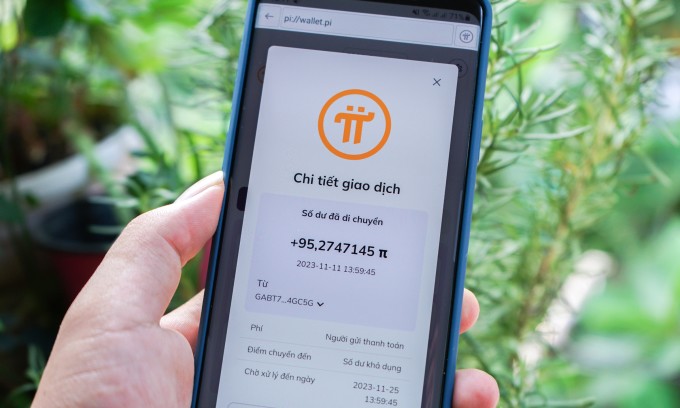Exchange Owner Refuses to List Pi
"Today many people asked me if I joined Pi. I said stop making fun of it," Ben Zhou, founder and CEO of Bybit, posted on X on February 12. Bybit is the second largest cryptocurrency exchange in the market by trading volume after Binance, according to CoinMarketCap statistics.
On February 12, the Pi Network project announced that it would "open the network", meaning it could trade with other cryptocurrencies, on February 20 after 6 years of development. Many cryptocurrency exchanges such as OKX, Mexc, Biget said they would list Pi, while some large exchanges such as Bybit have not yet announced this.

A smartphone displaying a test Pi cryptocurrency transaction in 2023. Photo: Bao Lam
In the post, Ben Zhou mentioned that he used to do forex trading and had a hard time making money, but was often asked to take it back by older people holding banners. "I really don't want to participate in this world of cryptocurrency. Stay away," Zhou added.
Bybit CEO's post was accompanied by an analysis of the Pi Network project from expert Haotian CryptoInsight after several exchanges listed Pi.
Haotian believes that Pi Network is especially popular in markets with low financial literacy, and slogans like "one Pi equals one Bitcoin" have contributed to many people misunderstanding its true value. The more intense the market reaction to a cryptocurrency listing, the more problematic it becomes.
The expert also hinted that the fact that cryptocurrency exchanges choose to list Pi, but ignore many technological cryptocurrencies, could be a sign that liquidity in the market is gradually drying up and exchanges need to find projects to attract new users.
'It's basically a game of 'who can draw fast', and everyone thinks they can be faster than the other person,' Haotian said.
In the post of Ben Zhou and Haotian, many people also gave mixed opinions. "Maybe Bybit is not listed by Pi Network, that's why they said that," commented an account with the profile picture of Pi Network's logo.
Pi Network is a project launched in 2019, advertised as helping users own free Pi virtual currency by entering the phone application "pressing the lightning bolt" to check in every day. Vietnam is one of the markets with many people participating in "Pi mining". According to Similarweb statistics, Vietnam is continuously in the top 3 of project website traffic.
However, the project has been controversial for maintaining a long period of "closed mainnet", meaning users cannot do anything with the Pi coins they own. The project claims to have more than 60 million users.
The "network opening" on February 20 means that the Pi on the phone can move to other platforms for exchange and trading. However, many people have reported that identity verification and Pi transfers often encounter errors, requiring users to wait for months. Domestic authorities have also warned that Pi's operations show signs of solicitation, with money from previous users paying later users in a multi-level marketing business model, and have recommended that people be cautious of acts of solicitation to participate in virtual currency models with unusually high profits.
You should read it
- ★ What is cryptocurrency? Is it legal? Advantages and disadvantages like?
- ★ Cryptocurrency exchange AscendEX hacked, loss of nearly 78 million USD
- ★ Another major cryptocurrency trading platform was hacked, $ 80 million 'failed'
- ★ $2.2 Billion in Cryptocurrency Stolen Worldwide by 2024
- ★ Dapp Development Frameworks